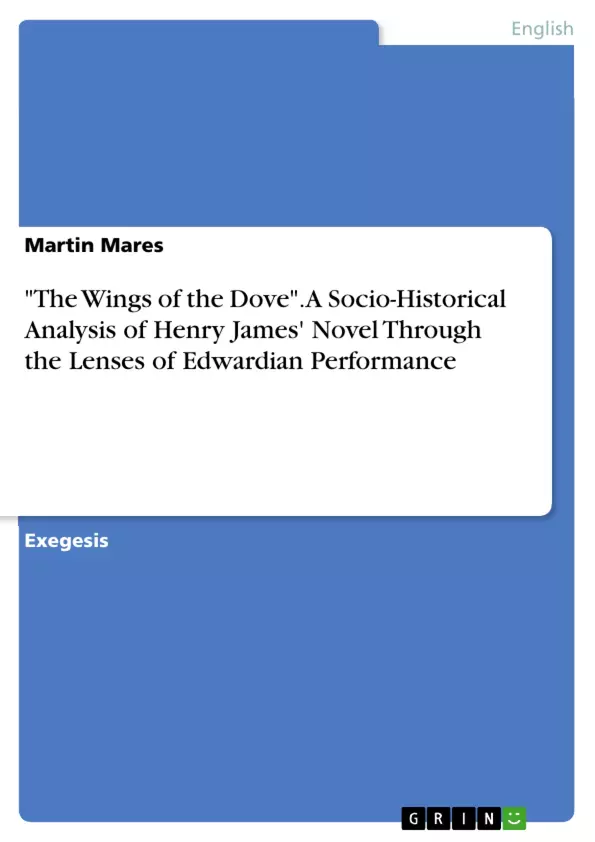This is a critical analysis of Henry James' novel "The Wings of the Dove" with a particular emphasis on a dichotomy of Michael Trask's and Slavoj Zizek's interpretations through the concept of an Edwardian performance. The entire paper is clearly written for experienced scholars with deep knowledge of James' life and even more profound knowledge of "The Wings of the Dove", since Trask's frequent referencing to particular parts of the book with either single words or short phrases presumably operates with the notion that the reader is a seasoned aficionado of Henry James, who is simply able to connect subtle references to whole parts of the book by heart. However, Trask's essay does not bring any ground-breaking ideas, and the content itself gives an impression of interesting, but not necessarily useful interpretation of the "Wings of the Dove".
Žižek presents set of interesting and well-elaborated arguments supporting his initial claim that the real ethical hero of the novel can be only Kate due to her behaviour and consequent choice during the last scene of the book. The ethical map sketched for Kate’s decision is sketched by Žižek according to atheistic perspective, which denounces the possibility of Milly’s Dove-like heroic "self-sacrificial goodness" with strong Biblical underpinning. Moreover, Žižek claims that the process of "losing the ethical substance" and thus opening up new space captures the ethical formula of James' book perfectly since the loss of ethical substance should be seen as a positive opening. It is no surprise then, that Žižek teases the reader with possible interpretations of the "dove" ranging from classical reference to the 55th Psalm to a reading of Densher's dove-like desires as an attempt to "escape from everything".
Table of Contents
- Michael Trask's Interpretation of "The Wings of the Dove"
- The Paradigm of New Historicism
- The Role of Chance, Choice and Mobility
- The Status of Immigrants and "The Stranger in the Land"
- The Anxiety of Groundlessness
- An Allegory for 1900s Scenarios
- Slavoj Žižek's "Kate's Choice"
- The Application of Lacanian Theory
- The Ethical Map of Kate's Decision
- The Big Other and the Status Quo
Objectives and Key Themes
This analysis explores Henry James's novel, "The Wings of the Dove," through the lens of Edwardian performance. It compares and contrasts the interpretations of Michael Trask and Slavoj Žižek, examining how their perspectives contribute to understanding the complexities of the novel's themes.
- The socio-historical and cultural context of Edwardian society
- The dynamics of choice, belief, and chance encounters
- The role of class relations and migration in shaping individual identities
- The exploration of ethics and materialism in the novel's narrative
- The impact of performance and theatrical elements on the novel's characters and plot
Chapter Summaries
The analysis focuses on two critical interpretations of "The Wings of the Dove": Michael Trask's "The Romance of Choice" and Slavoj Žižek's "Kate's Choice." Trask's interpretation highlights the influence of socio-historical contexts on the novel's characters and their choices. He emphasizes the connections between mobility, chance, and the breakdown of private and public spheres. Trask also examines the role of immigrants and their impact on the narrative.
Žižek's analysis, a chapter from his book "Lacan: The Silent Partners," focuses on the last scene between Kate and Densher, applying Lacanian theory and Marxist concepts to explore ethical and materialist themes. Žižek presents Kate as the ethical hero of the novel, emphasizing her decision-making process and its implications for the narrative's conclusion.
Keywords
This analysis explores the concept of Edwardian performance, focusing on key themes such as choice, belief, chance encounters, class relations, migration, ethics, materialism, and the role of the "Big Other" in shaping individual identities. The analysis further examines the interpretations of Michael Trask and Slavoj Žižek, incorporating their perspectives on the novel's narrative structure, character motivations, and the social context of Edwardian society.
Frequently Asked Questions
What is Henry James' "The Wings of the Dove" about?
The novel explores themes of love, betrayal, and materialism through the story of Milly Theale, a wealthy but dying heiress, and a couple's plot to inherit her fortune.
How does Slavoj Žižek interpret the novel?
Žižek applies Lacanian theory, arguing that Kate Croy is the real ethical hero due to her radical choice and the loss of her "ethical substance" at the end.
What is Michael Trask's perspective on the book?
Trask uses New Historicism to analyze the novel through Edwardian performance, focusing on chance, social mobility, and the status of "strangers" in society.
What does the "Dove" symbolize in the story?
The dove symbolizes Milly Theale’s sacrificial goodness and purity, but critics like Žižek also read it as an attempt to escape from worldly reality.
What role does Edwardian society play in the narrative?
The rigid class structures and the pressure of "performance" in Edwardian culture dictate the characters' deceptive behaviors and moral dilemmas.
- Quote paper
- Dr. Martin Mares (Author), 2017, "The Wings of the Dove". A Socio-Historical Analysis of Henry James' Novel Through the Lenses of Edwardian Performance, Munich, GRIN Verlag, https://www.grin.com/document/505044



